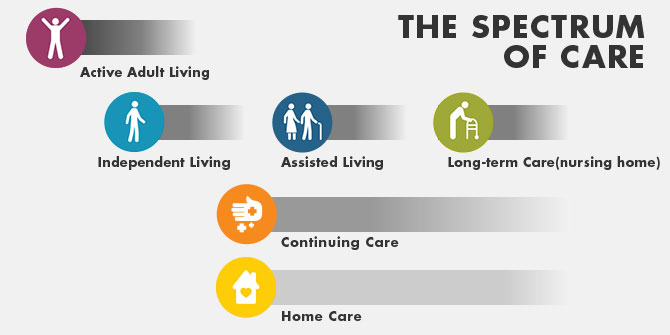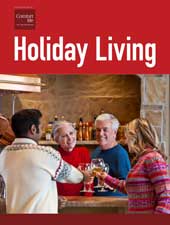Lists of reports on this page:
Find care details, insights, and insider perspectives gained from 20+ years of helping seniors and families.
What to know about this topic:
- Types of retirement living in Burlington
- How much does a retirement home in Burlington cost?
- Medical and safety services
- Recreation and social activities for seniors
- Getting around Burlington
- Availability of retirement homes in Burlington
- Choosing a retirement community in Burlington
- Burlington retirement community regulations
Burlington may only be a small city compared to its neighbours, Toronto and Hamilton, but it is known across Canada as one of the best places in the country to retire. Having been featured in MoneySense Magazine’s Top 10 places to live for several years in a row, Burlington lives up to its title with a high doctor to resident ratio, beautiful natural features to discover and a number of excellent retirement homes. This is your guide to finding the right retirement community in one of Canada’s top-ranked cities.
IN-DEPTH REPORTSRetirement communities in Burlington
The Village of Tansley Woods
At The Village of Tansley Woods, we offer the full continuum of care - Independent Living Suites, Retirement Apartments, Full Service Retirement Suites, Assisted Care, Memory Care and Long Term Care all in one village.
Lifestyle Options: Apartments, Independent Living, Assisted Living, Memory Care
Heritage Place Retirement Residence
Heritage Place is an independently owned retirement residence in Burlington, specializing in quality accommodation & services for the active senior, with 2 styles of living: apartment style suites & 2 bedroom bungalows
Lifestyle Options: Apartments, Independent Living
Types of retirement living in Burlington
Retirement homes in Burlington serve seniors from throughout the Halton region and the GTA. The full spectrum of care (see image below), from independent living to long-term care, is available in Burlington – often as a continuum of care.

Communities that offer a continuum of care combine independent and assisted living, and in some cases even long-term care, and can offer everything from suites with kitchens and concierge services to meal plans, laundry and cleaning services, medication management and personal care. In this type of retirement living, residents can smoothly transition from living unassisted in a community for the companionship and amenities to gradually receiving more care and support as needed. Choosing a retirement home in Burlington with all three options allows residents to avoid the hassle of moving and stay within a familiar community and support network as they age. Burlington is also home to retirement communities that specialize in one type of care. A residence specifically designed for independent living or a community that focuses on providing solely long-term care may be the perfect choice for you or your loved one(s). To find out more about how to choose the right retirement community for you, see below.
How much does a retirement home in Burlington cost?
Due to the high quality of life in Burlington, Halton Hills, Oakville and Milton, the retirement costs in these cities are some of the highest in the GTA. Across the Halton region, only about 10 percent of retirement homes have monthly costs under $3, 000. According to the 2014 Seniors Housing Survey, more than 70 percent of Halton’s retirement homes have monthly costs above the provincial average of $3, 200, and are closer to upwards of $3, 500. Of course, the cost of retirement living will vary with the lifestyle options and care you or your loved one(s) choose(s). Every retirement home offers different rates, and includes different services in its care packages. Although some retirement homes do include these services, extra costs can come from meal plans, laundry and housekeeping, television and telephone fees and added personal care. The task of deciding what options will best fit your health care needs as well as your budget may seem daunting, but well-run retirement communities can help you customize your care while keeping future health developments in mind.
Some of the most common ways of paying for retirement are through savings, pensions, Canadian Pension Plan (CPP) and Old Age Pension. The sale of the family home is also a good way to finance retirement costs.
If you are looking for a long-term care home, your Local Health Integration Network (LHIN) can help you or your loved one(s) find placement and provide more detailed cost information. Long-term care homes are funded by the government of Ontario have their rates for basic accommodation set by the province. Some residents of long-term care homes living in basic accommodations and who have an annual income below $21, 000 may also be eligible for a rate reduction. The Ontario government can also provide assistance when it comes to home care costs or prescription expenses. Seniors with high prescription drug costs relative to their income may benefit from applying to the Trillium Drug Program. Seniors over the age of 65 who live in Ontario and have a valid Ontario health card are eligible for application.
Medical and safety services
Burlington’s ranking in MoneySense Magazine as one of the top 10 places to live in Canada in 2014 was earned in part due to its high doctor to resident ratio of 2.5 doctors per 1000 – almost double the national average. The city has one hospital of its own, the Joseph Brant hospital, and there are additional hospitals in the neighbouring city of Hamilton – the Juravinski Hospital, Hamilton General Hospital and St. Joseph’s Healthcare Hamilton. The region also has a family health centre, Halton Family Health, located no more than 20 minutes form anywhere in Burlington. It’s good to know that hospitals and health care centres are nearby, but seniors in retirement living can turn to their communities for most of their day-to-day health needs. Modern retirement homes no longer need to outsource the majority of their health care to hospitals by employing permanent health teams as well as co-coordinating with third party health professionals, such as dieticians, physiotherapist and other specialists. Some of the professionals that work to provide seniors with mental, physical and medical health resources include:
- On-site nursing staff, often available 24/7
- An on-site doctor, or a doctor who visits residents on a regular basis (residents can opt to make this doctor their family doctor)
- Pharmacists
- Peronal trainers or fitness co-ordinators
- Physiotherapists
- Footcare nurse, manicurist and pedicurist
- Massage therapists
- Chiropractor
- Diaticians
- Dental health professionals
- Hair dressers and barbers
- Memory care support workers
- Specialized therapists (music, drama, memory therapies)
Retirement homes also collaborate with local organizations such as the Alzheimer’s society of Hamilton/Halton and the Hamilton Niagara Haldimand Brant Local Health Integration Network (HNHB LHIN) to offer residents and their families more support programs and care services. Although the services offered in retirement living will vary with every community, the health care offered in independent and assisted living will generally be different from the services provided in long-term care. Independent and assisted living is centered around preventative health care and overall wellness programs, including fitness and gentle exercise, brain training, massage therapy, chiropractic care and recuperative programs. Residents in assisted living can also benefit from assistance with daily living activities including bathing, dressing and mobility. Lon-term care, also known as extended care, can offer all of the above, as well as more comprehensive care to those with complex medical needs, including:
- Continence management programs
- Palliative care services
- Secure floors
- Memory care
- Condition-specific specialty medical care ie. Dialysis, tube-feeding
- Safety and nutrition are priorities for all types of retirement homes.
Emergency call services are present in suites or present as pendants and are often located in hallways for extra support. Three-piece bathrooms specially designed for seniors and no-slip floors are also installed in most suites to reduce the risk of falls. Those homes that assist patients with Alzheimer’s and dementia also offer overnight monitoring to ensure resident safety. The dietary staff in retirement communities make sure meals are both healthy and delicious, and oversee the serving of specialty meals to residents with any kind of dietary needs. Some homes offer snacks during the day and evening in addition to meals to help residents regulate blood sugar or sleep better at night.
Recreation and social activities for seniors
Seniors in Burlington have many different options when it comes to social activities and recreation. Outdoorsy types, social butterflies and artistic souls can all find opportunities to continue their vibrant lifestyles, meet new people and learn new skills throughout their retirement all over the city. In fact, seniors in retirement living may even find many of their options exist in their own backyard. One of the benefits of retirement living is the focus on social, emotional and physical wellness. Retirement homes employ activity co-ordinators or lifestyle managers to co-ordinate activities, events, fitness programs and outings for their residents. Some of the many recreational activities in retirement living include:
- Fitness and gentle exercise classes
- Yoga and zumba
- Tai chi
- Aquafit and swimming
- Billiards
- Line dancing
- Residence parties
- Shuffleboard
- Painting and art classes
- Concerts
- Theatre performances
- Golf and minigolf
- Movie nights
- Card games and tournaments
- Volunteer opportunities
Seniors living at home and in retirement living can also sign up for a membership with the Burlington seniors centre – a $36 annual investment that gives seniors the opportunity to connect with more of Burlington’s 55+ community and enjoy day trips, seniors programs and getting involved in volunteer work. Many retirement residences partner with local seniors centres to give residents access to more facilities and programs, such as the knitting club, current affairs round table discussions, African drumming program and Bistro Café at the Burlington Seniors Centre. You can find a full list of programs in the Burlington Seniors’ Centre booklet here.
Burlington is city with many beautiful natural features, golf courses, and near 600 hectares of parkland. The waterfront, for example, is one of its greatest draws, and its location on the Niagara escarpment lends itself well to hiking and sightseeing for active seniors. Burlington’s waterfront promenade is wide enough to accommodate cyclists, rollerbladers and those exploring on foot. Another attraction on the shore of Lake Ontario is Spencer Smith Park – home to a Japanese garden, a small beach and several performance areas, and the setting of Burlington’s Lakeside Festival of Lights. The Royal Botanical Gardens are also located in Burlington. Not only do the gardens boast an extraordinary number of natural plant and wildlife species, but the RBG hosts many seasonal exhibits and holiday events, including design workshops, sculpture collections, breakfast with Santa and a frog exhibit in the spring of 2015. Seniors can explore Burlington with their friends and family, but can also take advantage of the day trips organized by retirement homes. Residents can enjoy excursions to some of Burlington’s biggest natural attractions for guided hikes, wine tours and festivals, or choose to partake in more creative outings, such as an evening of theatre or a concert at the Burlington Performing Arts Centre.
Getting around Burlington
Active seniors an use the Burlington public transit to get around the city and connect them to GO transit and the rest of southern Ontario. The Burlington transit route service serves the southern, more urban, part of the city with low-floor buses equipped with priority seating. The bus service travels as far as Hamilton and stops at the Aldershot GO station, from where seniors can access the Lakeshore GO line and travel as far west as Oshawa. Although there is no reduced single fare for seniors on Burlington transit, bus passes and ticket packages for adults 65+ are offered at a reduced price. Seniors with mobility challenges and physical disabilities can apply for use of the Handi bus – Burlington’s accessible-door-to-accessible-door transit. For more information on accessible transit in the Halton region, visit the Burlington transit website. Most retirement homes have accessible buses of their own. These buses are primarily used to take residents on shopping trips or organized outings. Reserved parking is most often available at no cost to residents who drive.
Availability of retirement homes in Burlington
As the senior population continues to grow, so does the demand for retirement homes. The vacancy rate for standard spaces in Burlington sits as the third lowest rate in the GTA, at 12. 1 percent while the vacancy rate for heavy care spaces in the Halton/Peel regions was 0.3 percent in 2014. This means that you or your loved one may have to spend time on a wait list before moving into your chosen retirement home. Keep in mind that the following factors will inform the length of wait times:
- Crisis placement (if someone’s safety poses immediate risk)
- Location
- Type of accommodation: basic, semi-private or private or secure floor (Private or semi-private are more expensive but have shorter wait-times)
- Gender
- Medical care needs i.e. tube-feeding
- Unit designation- secure, non- secure.
Choosing a retirement community in Burlington
Finding the right retirement community for your needs and budget requires thought and pre-planning, but it doesn’t have to be stressful. Before you begin your search, take some time to find out where your priorities lie, and ask yourself and your loved one(s) the following questions:
- What do you need
- What do you want?
- What is your preferred location?
- What can you afford?
For a more comprehensive list of questions to consider, visit our page for seniors considering a retirement home. If you are unsure what you will be able to afford, use our online retirement calculator. The next step to finding the perfect retirement residence is making a shortlist of communities that meet your criteria. You can contact the Burlington residences listed above or use our advanced search to start creating your shortlist. Make sure to tour the residences on your list before you make your final decision. Download our free e-book on the ultimate retirement tour guide for a checklist of what to look for and what to ask. Some retirement homes even allow prospective residents to spend the night in a visitors suite to help you or your loved one(s) get a better sense of the lifestyle they offer. Start your search today or visit our advice guide for step-by-step details on choosing a retirement home.
Burlington retirement community regulations
Retirement homes require a licence from the Retirement Home Regulatory Authority (RHRA) to be able to operate in Ontario. The RHRA regularly inspects retirement homes and overseas compliance to the Retirement Homes Act of 2010, which requires residences to provide safe, consistent and high-quality care to residents. The RHRA has a Public Register available on their website which lists retirement homes that have applied for a license or are already licensees. Always make sure to check that the community you are considering has a good standing with the RHRA. Industry experts also recommend checking if a retirement home is a member of an outside organization such as the Ontario Retirement Communities Association (ORCA). Membership with ORCA or any of the following trusted associations is a sign that a retirement community will be safe and well-managed:
- The Ontario Long-term Care Association (OLTCA)
- AdvantAge Ontario (formerly the Association of Non-Profit Homes and Services for Seniors: OANHSS)
- The Canadian Association of Retired People (CARP)





